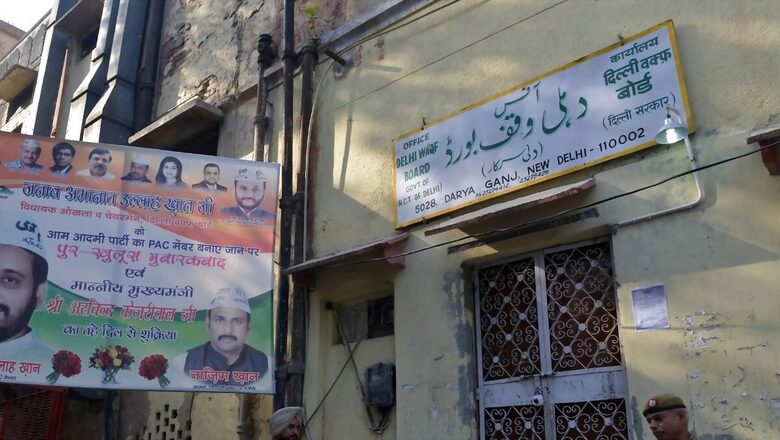
views
In 2019, the Central Government enacted the Muslim Women (Protection of Rights on Marriage) Act, effectively banning the practice of triple talaq. This legal milestone marked a significant step in protecting the rights of married Muslim women and curbing divorces through one-sided talaq pronouncements. Looking ahead, the Waqf (Amendment) Bill 2024 stands out as an important reform aimed at safeguarding properties donated for the welfare of the Indian Muslim community. This amendment seeks to boost transparency within the Waqf Board, enhancing its efficiency to ensure effective delivery of welfare initiatives to underprivileged Muslims.
There has been mounting anger against the Waqf boards due to their authoritarian practices. The Waqf Board is India’s third largest landowner, after the Indian Railways and the Indian Army. Over 9 lakh properties, amounting to Rs 1.2 lakh crore, are under the management of 32 state-level Waqf boards, governed by a handful of 200 appointed members. At present, over 40,000 cases await resolution in Waqf tribunals. The composition of these tribunals, which exclusively includes members of the Waqf bureaucracy, is a cause for serious concern and thus cannot be expected to deliver transparency in their judgments. Complaints such as encroachment, mismanagement, ownership disputes, and delays in registration and surveys reflect inefficacy and corruption in the current Waqf board setup.
A few notable incidents include the Delhi High Court observing unauthorised constructions on 123 Waqf properties in the heart of Delhi. In 2022, the Tamil Nadu Waqf Board claimed ownership of an entire village predominantly inhabited by Hindus. Interestingly, the Sunni Waqf Board also claimed rights to the Taj Mahal without any supporting documents.
Section 40 of the Waqf Act, 1995, provides Waqf boards with the authority to decide if a property is deemed a Waqf property. There have been many complaints that this power has been misused by custodians of Waqf boards for land grabbing. The proposed amendment now vests this power with the district collector for faster dispute resolution. It also mandates that the Waqf board register all its properties with the district collector’s office, enabling evaluation and ensuring transparency in all Waqf transactions.
Additionally, the amendment prevents Waqf boards from usurping any land without proper documentation, as deputy collectors and higher officers will survey the properties to ensure transparency.
Given its significance for the welfare of the Muslim public, the lack of adequate women’s representation on the Waqf Board is astonishing. Similarly, marginalised Muslim communities, such as Boras, Ahmadiyyas, Pasmandas, Shias, and other OBC Muslims, have long complained of being underrepresented on these Waqf boards, with the boards currently dominated by select elite factions, denying them a voice in the management of these community assets. Denial of inheritance rights to women and orphans by Waqf boards is a blatant misuse of the Waqf-al-Aulad provision. This bill is clearly aimed at fixing the issue of underrepresentation of Muslim women and backward Muslim communities on the Waqf boards. If not addressed, this would eventually create tensions among these sections.
While many Islamic countries like Turkey and Tunisia have abolished Waqf boards entirely, India, with its vibrant democracy, has allowed these boards to operate independently. The proposed amendments further strengthen this Waqf system. Opposition parties are making hue and cry solely for the sake of appeasement politics and to further create divisions in society for the sake of their vote bank politics.
In a country with a Hindu majority, temples in India are managed by government-appointed bodies or trusts. One has not seen Congress, the Samajwadi Party, or YCP demanding similar reforms or taking progressive steps to make temples independent of government control when they were in power. Additionally, the Government of India needs to create checks and balances in the functioning of Waqf boards by removing individuals charged with misuse of power.
The All India Sufi Sajjadanashin Council, the primary body representing Sufi shrines, has welcomed the government’s proposal and alleged that Waqf boards operate in a “dictatorial” manner. The amendments proposed by the government aim to protect the true custodians and owners of Waqf properties. Efficient management of these properties is expected to generate substantial revenue, which can be used to benefit poor Muslims, including children, women, and backward communities.
The Triple Talaq Act, despite initial controversy, has gained acceptance within the Muslim community and is viewed as enhancing marriage security for Muslim women. The government presents the Waqf (Amendment) Bill, 2024, as having a similar objective: safeguarding the interests of the wider Muslim community from potential undue influence by a select few.
The author is National Member, BJYM (Policy, Research, and Training division) MBA, IIM Lucknow. Views expressed in the above piece are personal and solely that of the author. They do not necessarily reflect News18’s views.


















Comments
0 comment